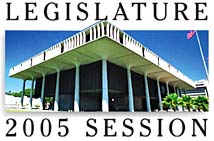Car seizure for drunken
driving revisited
This time lawmakers propose
that state transportation officials
handle the program
For the past several years, a proposal has been introduced in the Legislature that would punish repeat drunken-driving offenders by requiring them to forfeit their vehicles.
|
|
This year, Senate Judiciary Chairwoman Colleen Hanabusa is taking a different approach.
After hearing the proposal in committee yesterday, Hanabusa said she wants to find a way to put the burden on the state Department of Transportation.
Noting that the state has always favored the measure, Hanabusa (D, Nanakuli-Makua) asked Transportation Director Rod Haraga if he would still support the bill if it were his agency tasked with running the vehicle forfeiture program.
Haraga said no, prompting a mild scolding from the committee chairwoman, who said she would "look at a way of making this the state's problem."
"Think of a way to fund it," Hanabusa told Haraga.
"I think it's time for the Department of Transportation to take on this burden," Hanabusa said after the hearing. "There comes a point where, if you come here and you can be the good guy all the time and say, 'We're for this' -- make it work."
Haraga said he wanted to study the matter to see exactly how many cars would be forfeited under the measure and whether the state would be able to accommodate those vehicles.
"Are we talking about 10? Are we talking about 10,000? I don't know," Haraga said. "Without looking at the numbers, it'd be pretty hard for us to say, 'Absolutely not, we can't do it.'
"If we're talking about a minimal amount of cars -- say 100 cars -- it might be possible for us to work with the city and county."
He said currently the Transportation Department has no space to store vehicles, but it could work with other state agencies to find space if needed.
Under the intent of House Bill 919, House Draft 1, Senate Draft 1, those convicted of driving under the influence of drugs or alcohol three times in a five-year span would forfeit their vehicles. The forfeiture also would apply to those charged with habitual DUI -- a fourth DUI charge on top of three convictions within a 10-year span.
Deputy Prosecutor Lori Nishimura said the state averages about two habitual DUI cases each month.
Repeat offenders already face penalties including community service, fines, license suspension or revocation and prison.
It's unclear exactly how many vehicles would be forfeited each year under the proposal.
The Senate Judiciary Committee also heard two bills yesterday aimed at curtailing highway racing and restricting younger teenage drivers.
House Bill 862, H.D. 2, S.D. 1, would establish the petty misdemeanor offense of excessive speeding, defined as 25 mph over the posted speed limit, or 80 mph regardless of the posted limit.
The Honolulu Police Department testified in support of the measure, noting that speeding was a factor in 61 percent of fatal crashes in 2004, and 79 percent in 2003.
Jack Tonaki of the state Public Defender's Office testified against the proposal, saying excessive speeding can be punished under existing laws, such as reckless driving.
House Bill 150, H.D. 2, S.D. 1, would establish a three-step graduated driver-licensing program for those under 18 and place limits on when young drivers are allowed to drive alone.
[News] [Business] [Features] [Sports] [Editorial] [Do It Electric!]
[Classified Ads] [Search] [Subscribe] [Info] [Letter to Editor]
[Feedback]

